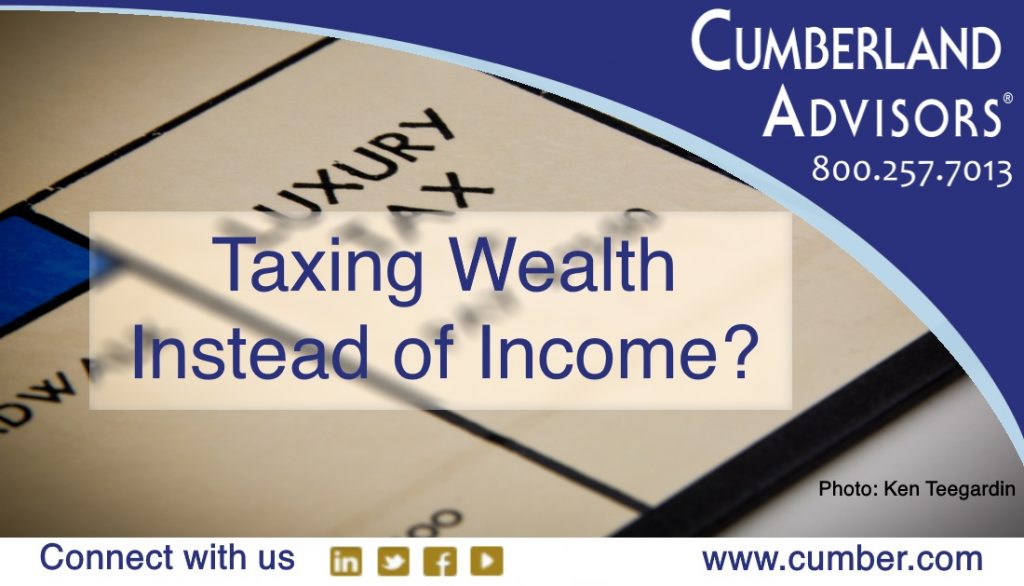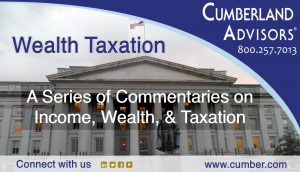With the desire to finance both an increasing deficit and an increase in government services, politicians are searching far and wide for funds. Increasingly, proposals are surfacing to tax wealth rather than income as the means to fund pet projects. The proposals attract followers since unequal distribution of wealth is viewed as a problem that needs to be addressed. However, we really need to think through the implications of going down this road.
First, it is important to understand the distinction between income – a flow of money from work and investments – and wealth – an accumulation of assets, things that we have. We all know that we can borrow to fund our acquisition of things, which then have to be financed out of current income. Most recent proposals therefore have actually focused on taxing net worth- reflecting the difference between what we owe and what we have.
While it is easy to refer to wealth in the abstract, it is important to recognize the wide range of assets that constitute our wealth. These include our homes, cars, financial assets, clothes, vacation homes, yachts, intellectual property rights, patents, etc. Some of these are easily valued while others are more problematic. One of the most recent wealth tax proposals would tax net worth over $10 million at 2% and net worth over $1 billion at 3%.
One of the interesting points about the wealth tax is that it taxes net worth – our things – each year, whereas an income tax is based on our current year’s income. Here is an interesting thought experiment. Suppose you have $1 billion, and it is taxed 3% every year. In 10 years, assuming the principal was not invested, you would have slightly less than $750 million remaining, and in 20 years you would have about $540 million. So, in effect, the government is saying that you have too much stuff and they are going to take it. In the extreme, this is not really different from the government saying that you have too many cars or that your house is too big and therefore you must let someone use one of your cars or one or two of your rooms at your expense.
More seriously, it is interesting to look at how the composition of wealth differs over classes of different net worth. The Federal Reserve’s survey of consumer finances contains information that allows us to get a better picture of how the distribution of stuff differs across different wealth cohorts. For the lower tiers, real estate, autos, retirement funds, and liquid assets comprise the bulk of net worth. At the other extreme, for those with a net worth in excess of $1 billion, the target cohort for the net worth tax, those same assets are a minuscule portion of their net worth (See Chart, "What Assets Make Up Wealth?" at https://www.visualcapitalist.com/chart-assets-make-wealth/).
More than two thirds of the wealth of the $1-billion-dollar-net-worth cohort is composed of what is termed “business interests.” The Survey of Consumer Finances divides “business interests” into those business interests in which the owner has an active management role and those in which the owner does not play an active role and well over 90% of such business interests constitute active management. Thus those who wish to tax wealth rather than yearly income are, in fact, targeting mainly privately held business interests whose value is derived from the active entrepreneurial involvement of the principal and his or her family (1). Such assets are hard to identify, since they can include loan guarantees, intellectual property, etc. Those business interests are not frequently traded and are extremely hard to value. These are the same business interests that generate employment and benefits to many others. To implement a tax that serially requires a potential long-term expropriation of and monetization of productive businesses activities in the name of funding other social objectives requires very careful review and analysis of the costs and benefits.
The same survey also shows that one of the main determinants of wealth is education, and the returns are greatest to a college education (2). To be sure, we have recently heard about the problems of excessive student debt, and a recent Wall Street Journal article convincingly shows that students who attend but don’t finish college can be even worse off than those who don’t have a college degree (3). However, that same article also shows that unemployment rates are lower among college graduates and those with some college than for those with no college, and earnings show a similar pattern.
We need to remember that our Declaration of Independence promotes the “pursuit of happiness,” which has come to mean equal opportunity, not equal incomes or equal wealth. Given the evidence on education and wellbeing, we need to consider whether the key to dealing with the so-called problems of income and wealth inequality may be education and not government redistribution policies. Maybe we should focus on programs to raise those on the bottom while taking advantage of the often philanthropic tendencies of people with large accumulations of wealth. Perhaps we should consider policies, as just one example, that reduce inheritance taxes if a wealthy individual donated some of his or her wealth in advance of passing, provided that the gifts are to support qualified educational initiatives and keeping people in college who otherwise might be forced to drop out. This provides a carrot and opportunity for a wealthy individual to do good and avoids government expropriation with no guarantees that the funds will be used to address a social problem.
Robert Eisenbeis, PH.D.
Vice Chairman & Chief Monetary Economist
Email | Bio
Sources:
- “Changes in U.S. Family Finances from 2004 to 2007: “Evidence from the Survey of Consumer Finances,” Brian K. Bucks, Arthur B. Kennickell, Traci L. Mach, and Kevin B. Moore, revised 2009, Federal Reserve Bulletin, Vol. 95, 2009, https://www.federalreserve.gov/pubs/bulletin/2009/articles/scf/default.htm.
- Ibid.
- https://www.wsj.com/graphics/calculating-risk-of-college/
Here are links to our recent writings on the subject of Wealth Taxation.
“Wealth Tax,” David Kotok, October 9, 2019
https://www.cumber.com/cumberland-advisors-market-commentary-wealth-tax/
“Taxing Wealth Instead of Income?” Bob Eisenbeis, February 13, 2019
https://www.cumber.com/taxing-wealth-instead-of-income/
“Taxing Wealth Instead of Income, Part 2,” Bob Eisenbeis, October 15, 2019
https://www.cumber.com/taxing-wealth-instead-of-income-2/
"The Kiplinger Tax Map: Guide to State Income Taxes, State Sales Taxes, Gas Taxes, Sin Taxes," David Kotok, October 25, 2019
https:/www.cumber.com/cumberland-advisors-market-commentary-the-kiplinger-tax-map-guide-to-state-income-taxes-state-sales-taxes-gas-taxes-sin-taxes/
Links to other websites or electronic media controlled or offered by Third-Parties (non-affiliates of Cumberland Advisors) are provided only as a reference and courtesy to our users. Cumberland Advisors has no control over such websites, does not recommend or endorse any opinions, ideas, products, information, or content of such sites, and makes no warranties as to the accuracy, completeness, reliability or suitability of their content. Cumberland Advisors hereby disclaims liability for any information, materials, products or services posted or offered at any of the Third-Party websites. The Third-Party may have a privacy and/or security policy different from that of Cumberland Advisors. Therefore, please refer to the specific privacy and security policies of the Third-Party when accessing their websites.
Sign up for our FREE Cumberland Market Commentaries
Cumberland Advisors Market Commentaries offer insights and analysis on upcoming, important economic issues that potentially impact global financial markets. Our team shares their thinking on global economic developments, market news and other factors that often influence investment opportunities and strategies.



